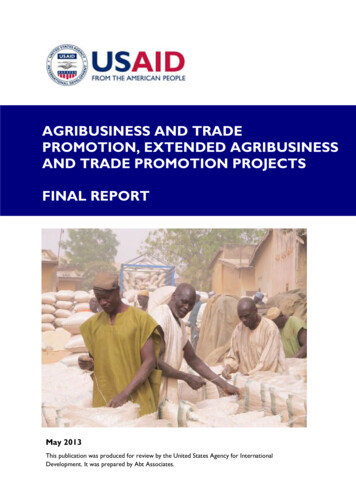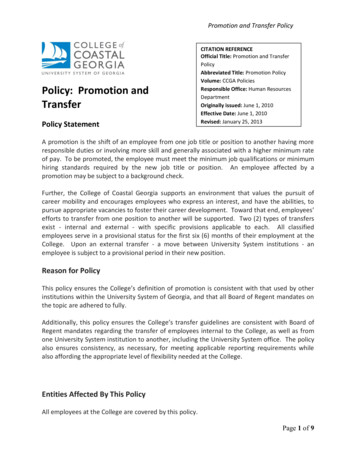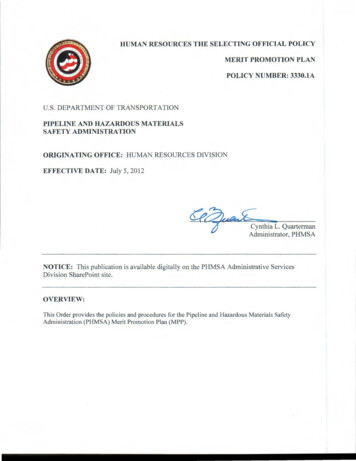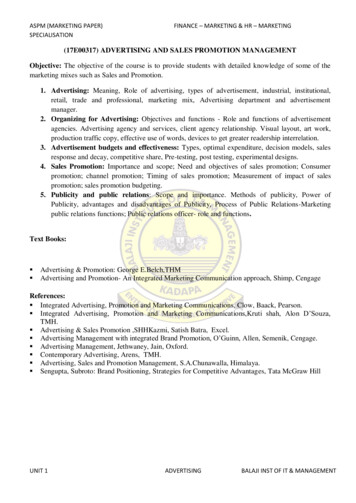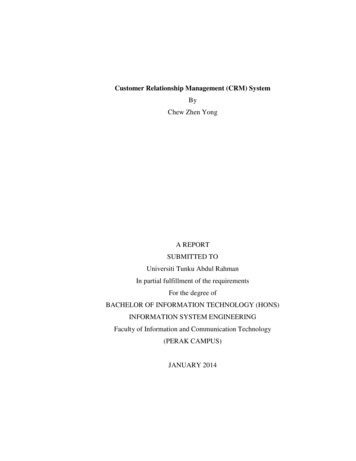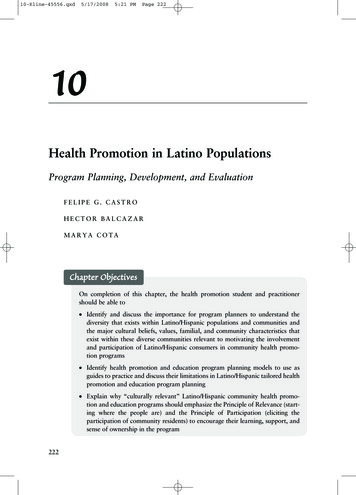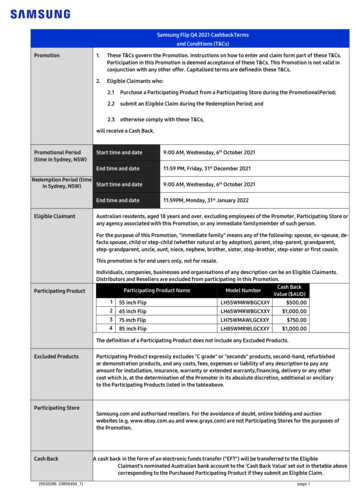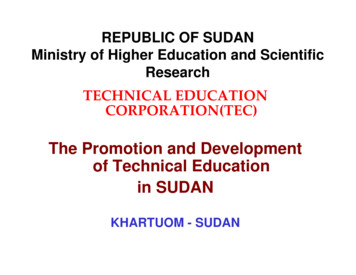
Transcription
REPUBLIC OF SUDANMinistry of Higher Education and ScientificResearchTECHNICAL EDUCATIONCORPORATION(TEC)The Promotion and Developmentof Technical Educationin SUDANKHARTUOM - SUDAN
CONTENTS1- Introduction2- Historical background of the TechnicalEducation in Sudan3- Current situation of Technical Educationin Sudan4- The National Project5- The Technical Colleges.6- Promotion of T.E .7- Challenges .
1- IntroductionTechnical education is distinguished fromothertypes of education , because of :- its direct link to the needs of the labourmarket ;- it promotes the economic and social life ;- it follows-up the new technicalmodifications.
The qualifying of the Technician needsseveral capabilities such as :-Establishing laboratories and specializedworkshops ;-Preparation and qualifying of instructors andtrainers ;-Review of the curricula in accordance with theneeds of the labour market and development.
2- Historical background of Technicaleducation in Sudan :1902 - Gordon Memorial college (GMC) established avocational and technical education secondary school( four years ofstudy : two academic and twovocational ) .1939 - Post secondary technical education introduced .1951- Khartoum Technical Institute (KTI) established byannexing to it all the training units in the differentgovernmental departments . The period of study isthree years after the secondary school .
1962- In the (KTI) , the period of study for the diploma wasincreased from three years to four years .1971- The (KTI) was divided and distributed to a number technicalcolleges in the different regions in the Sudan .1975- The (KTI) was transformed into the Institute of TechnicalColleges (ITC) .1983- The (ITC) started studies ofBachelorTechnology (B. Tech ) the diploma degree .degreeof1990- The (ITC) was transformed to the Sudan University of Scienceand Technology (SUST) .
International Pyramid for the Labor ForceMental SkillsSpecialists1Technicians4-6Skilled Laborers15-20Under SkilledLaborersPhysical Skills
TECHNICAL EDUCATION TRACKSLABOUR MARKETAgeSpecialistsTechniciansSkilled 53 ECHNICAL SECONDARY EDUCATION143ACADEMIC/TECHNICAL SECONDARY EDUCATION6BASICBASIC EDUCATIONEDUCATION 83 Certificate
3- Current Situation of TechnicalEducation :The following bar charts show the distributionof diploma students for Higher Educationinstitutions for the academic years 2001/2002up to 2004/2005
22002-20032003-20042004-2005HumanitiesAgricultural Medical onsEngineeringSciencesN o . o f S tu d e n tsDistribution of Diploma Students for Higher Education Institutionsfor the Academic Years 2001/2002 up to 2004/2005
iences &ComputerSpecializationsN o . o f S tu d e n tsDistribution of B.Sc. Students for Higher Education Institutions forthe Academic Years 2001/2002 up to 2004/2005
4- The National ProjectEstablishing Ideal technical colleges(a) College Objectives:-1- Providing scientifically and practicallyqualified technicians able to work inthe changing modern technology.2-Giving due consideration to scarcetechnical specializations .
3 - Giving due consideration to appliedscientificresearchrequiredtothecountry's development plans .4- The selected specialization of thesecolleges must satisfy the local needs of thecommunity around the college premises .
(b) College Tributaries1- Technical secondary schools (industrial,agricultural commercial and woman studies)2- Academic secondary schools.3- Successful students in the qualifying coursefor students of vocational training centersand apprenticeship institutes.
(c) Characteristic features of thecollege:1.2.3.4.5.6.Study system: credit hours systemType of study :Diploma levelNumber of Departments: 3-5 departmentsNumber of semesters : 4-6 semestersStudy hours in class :15-20 credit hoursTotal credit hours for each programme : 70 –110hours.7. Total contact hours (Practical trainingincluded) :1500 - 2500 hours
(d) Preparations : LaboratoriesWorkshopsHalls and theatresOfficesComputer labsEquipment and devicesLibraryPublic utilities, gardens andpassages
(e) Fields of Technical Colleges:1- Technical Engineering Colleges :( Civil Engineering )(Construction - Irrigation and drilling - Sewage system Roads and bridges - Buildings and quantitativemethods - Surveying - Environmental Engineering Hydraulic Engineering)(Electrical Engineering)(Internal Electrical Connections - Electrical Networks Electronic devices- Computer maintenance - ComputerNetwork - Medical equipment and instruments Communication - Electrical Equipment and Devices)
( Mechanical Engineering)(Automobile - Thermal power - Jetengineering - Agricultural Machine Heavy Machines - Air conditioning andRefrigeration - Welding and Smithery Metallurgy – Foundary ).(Petroleum and Mining Engineering )(Drilling - Petroleum refining - Mining Petroleum transport (Pipeline only)
( Textile Engineering)(Trico - Dyeing and Printing - Textile Spinning and Weaving) .( Chemical Engineering)(Food processing - Pharmaceuticalmanufacturing - Leather - Plastics - Oilmanufacturing – Sugar technology ) .
2- Health Technology Colleges:(Medical laboratories - Cardiography - Optics Radiology - Anaesthesia - Stomatology – Dentaltechnology - Public health - Nursing - Artificiallimbs - Physiotherapy)
3- Agricultural Technology Colleges:(Agricultural Mechanization - Cropproduction - Horticulture - Cropprotection - Forestry - Food technology Animal health - Animal production - Soil Ecology and desertification – Pasture)
4- Social and Commercial Technology Colleges:(Accounting - Business administration Computer applications - Guidance and education- Social service - Clinical psychology Kindergarten - Applied statistics – Womandevelopment)
When designing the programmes of thesecolleges , the following points should be noted :1-The programmes are unique and not aprint copy of other ones.2- Special considerations to be given for rarebut important specializations.3- The programmes must obey the localcommunity needs .4- The programmes must fulfill the countrydevelopment needs .
The Number oF Technical Colleges Now Is 19 :Nyala Technical College- Southern Darfour StateElbadri Technical College- Nile Valley StateElmehairiba Technical College- Gaziera StateKenana Technical College- White Nile stateKassala Technical College- Kassala StateBentio Technical College- Unity StateElgetaina Technical College- White Nile stateWad Madani Technical College - Gaziera StateElgeraif Sharg Technical College - Khartoum StatePortsudan Technical College- Red Sea StateMarawi Technical College- Northern stateGadarif Technical College- Gadarif StateElfieg Technical College- Gaziera StateRabak Technical College- White Nile stateOm Rowaba Technical College - North Kordofan stateDamazin Technical College- Blue Nile stateFadasi Technical College- Gaziera stateElbadri Health Technical College - Nile Valley StateFaris Technical College- Gaziera State
COLLEGE DEPARTMENTS & SPECIALIZATIONS :MechanicalDepartment- Agricultural Machines- Automobile- Conditioning & Refrigeration- Mechanics & Production- Maintenance Machines- Mechanical Electronic- Maintenance Ships
ElectricalDepartment-Networks & Electrical Communications.-Electrical Machines .- Electronics- Medical devices- Control Systems- Power Generation
CivilDepartment- Water Technology-Road & Bridges- Buildings- Technical Drawing- Architectural Decoration- Technical Drawing by Computer
SocialDepartment- Social Development- Administrative Sciences- AccountingComputerSciences- Computer Sciences- Commercial & Accounting Systems
AgriculturalDepartment- Agricultural Production techniques- Animal Production techniques
6- Promotion of TechnicalEducationThrough :- Different Mass Media : Written, Spoken &Seen .- Highlighting the role of the technicians indevelopment as a whole and givingexamples of some developed countries suchas UK , Korea , Germany , Japan, , ETC.
- Improvement of employment services .- Close links between the Technical educationand the work sectors .- Exemption from tuition fees .- Offering free accommodation for technicalstudents .- Upgrading of technicians through morequalifications .
7- Challenges Facing TechnicalEducation:1- Improving the ratio of Diploma to B.Sc.2- Finance : government , foreign donations, privatesector , trainee fees .3- Capacity building of teachers and lization.5- Development of curricula to suit the labour market.6- Quality of Technical Education7- Flexibility in admission8- Diversification of programs
Thank you for yourattention
1902 -Gordon Memorial college (GMC) established a vocational and technical education secondary school ( four years of study : two academic and two . technology -Public health -Nursing -Artificial limbs - Physiotherapy) 3- Agricultural Technology Colleges: (Agricultural Mechanization - Crop




